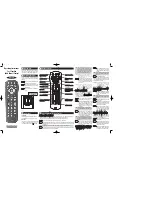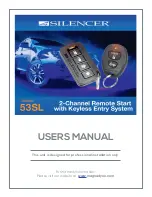
warnIng!
modern vehicles contain extensive electronic systems.
You are required to check with the vehicle Manufacturer, for any specific instructions regarding the use of this type of equipment on
each vehicle.
No liability will be accepted for damage / injury, where this product is not used in accordance with all instructions.
1.3.
personaL precautIons
9
ensure there is another person within hearing range of your voice and close enough to come to your aid, should a problem arise when
working near a lead-acid battery.
9
Wear safety eye protection and protective clothing. Avoid touching eyes while working near battery.
9
Have fresh water and soap nearby in case battery acid contacts skin, clothing or eyes.
9
Wash immediately with soap and water if battery acid contacts skin or clothing. if acid enters eye, flush eye immediately with cool, clean
running water for at least 15 minutes and seek immediate medical attention.
9
remove personal metallic items such as rings, bracelets, necklaces and watches. A lead-acid battery can produce a short-circuit current
which is high enough to weld a ring or the like to metal, which would cause severe burns.
9
ensure hands, clothing (especially belts) are clear of fan blades and other moving or hot parts of engine, remove ties and contain long hair.
8
do not
smoke or allow a spark or flame in the vicinity of battery or engine.
1.4.
chargIng saFety InstructIons
9
familiarise yourself with the application and limitations of the starter as well as the potential hazards. Also refer to the vehicle
manufacturer’s handbook. IF IN ANY DOUBT CONSULT A QUALIFIED ELECTRICIAN.
9
ensure the starter is in good order and condition before use. if in any doubt do not use the unit, contact your sealey stockist.
9
use the starter in the upright position only and ensure it is placed on a stable surface which will adequately support its weight.
9
Ensure the starter is disconnected from the mains supply before attaching/detaching the power clamps to/from the battery.
9
Keep tools and other items away from the engine and ensure you can see the battery and working parts of engine clearly.
9
ensure the output of the starter is the same voltage as the battery.
9
if battery has caps to access the battery fluid, remove the caps and check the fluid level before connecting the power clamps.
9
If necessary top-up the battery with distilled water by referring to the battery manufacturer’s instructions (Apply the personal safety
9
precautions described in part 1.3).
9
if the starter receives a sharp knock or blow the unit must be checked by a qualified service agent before using.
9
if the battery terminals are corroded or dirty clean them before attaching the power clamps.
9
Keep children and unauthorised persons away from the working area.
8
do not
dis-assemble the starter for any reason. the starter must only be checked by qualified service personnel.
8
do not
try to boost or charge battery if battery fluid is frozen.
warnIng!
to prevent the risk of sparking, short circuit and possible explosion
do not
drop metal tools in the battery area, or allow
them to touch the battery terminals.
8
do not
allow power clamps to touch each other or to make contact with any metallic part of the vehicle.
8
do not
cross connect power leads from starter to battery. Ensure positive (+/RED) is to positive and negative (-/BLACK) is to negative.
8
do not
pull the cables or clamps from the battery terminals.
8
do not
use the unit to recharge dry cell batteries (commonly used in home appliances). These batteries may burst and cause injury to
persons and/or damage to property.
8
do not
store the unit in damp or wet locations or where temperature may exceed 50
o
c.
8
do not
submerge the unit in water.
8
do not
use starter inside vehicle or inside engine compartment.
8
do not
leave the unit in a totally discharged state for an extended period of time as this will result in permanent damage.
8
do not
use the starter for a task for which it is not designed.
warnIng!
if a fuse blows, ensure it is replaced with an identical fuse type and rating. use only sealey genuine parts.
9
When not in use, store the starter carefully in a safe, dry, childproof location.
this appliance can be used by children aged from 8 years and above and persons with reduced physical, sensory or mental capabilities or lack
of experience and knowledge if they have been given supervision or instruction concerning use of the appliance in a safe way and understand the
hazards involved. children shall not play with the appliance. cleaning and user maintenance shall not be made by children without supervision.
2.
i
IntroductIon
Heavy-duty steel case, high power battery and industrial quality switchgear make this model suitable for starting most vehicles. Positive action
power switch reduces risk of inadvertent damage by over-voltage. Heavy-duty copper cables provide efficient power transfer. twin trips prevent
damage to battery or internal circuitry. Easy-to-read LED battery indicator to IEC 51 provides fast indication of battery’s state of charge. Surge and
spike suppressing circuitry reduces risk of damaging vehicle’s on-board electronics. Fitted with charge balance circuitry to provide even charge to
integral batteries. supplied with mains voltage recharge unit.
3.
i
specIFIcatIon
model no: .................................................... PstArt1000Hd
Voltage: ....................................................................
12V/24V
maximum engine size:............................................... 1000hp
Peak Amps 12V: ...........................................................7000A
Peak Amps 24V: ...........................................................3500A
cranking current (20°c 5secs) 12V: ............................1900A
cranking current (20°c 5secs) 24V: ..............................950A
cold cranking current (-18°c 30secs) 12V: ...................800A
cold cranking current (-18°c 30secs) 24V: ...................400A
cable section: .............................................................35mm²
cable & clamp length: ...................................................2mtr
Weight: ........................................................................... 26kg
Original Language Version
© Jack sealey limited
P
START1000HD Issue 3 (H, 1, 4, F) 22/12/17






















